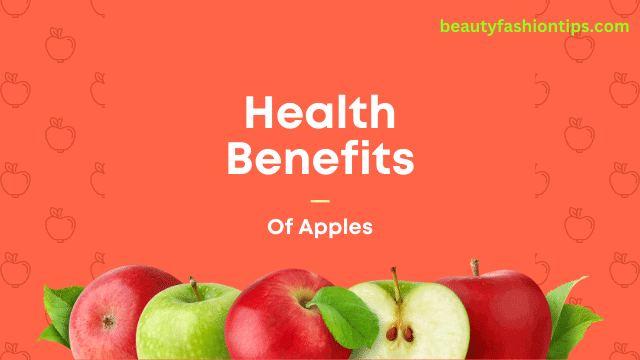Apples are one of the most commonly eaten fruits in the world. They are delicious, affordable, and available in many different varieties. However, apples are more than just a tasty snack. They also provide a wide range of health benefits that can help you stay healthy and prevent chronic diseases. In this article, we will discuss the various health benefits of apples and why you should consider adding them to your daily diet.
The Nutritional Profile of Apples
Contents
Before we dive into the health benefits of apples, let’s first take a look at their nutritional profile. Apples are low in calories but high in fiber, vitamins, and minerals. A medium-sized apple contains:
- 95 calories
- 25 grams of carbohydrates
- 4 grams of fiber
- 14% of the daily value (DV) for vitamin C
- 6% of the DV for potassium
- 5% of the DV for vitamin K
Apples also contain small amounts of other vitamins and minerals, such as vitamin A, calcium, and iron. In addition, apples are rich in antioxidants, which help protect your body from damage caused by harmful molecules called free radicals.
Health Benefits of Apples
Now that we have covered the nutritional profile of apples, let’s dive into the various health benefits they offer.
1. Apples May Help with Weight Loss
If you are trying to lose weight, adding apples to your diet may be a good idea. Apples are low in calories and high in fiber, which can help you feel full and satisfied. In fact, studies have shown that eating apples before a meal can help you eat fewer calories overall.
2. Apples May Reduce the Risk of Heart Disease
Heart disease is the leading cause of death worldwide. Fortunately, eating apples may help reduce your risk of developing this condition. Apples are rich in antioxidants called flavonoids, which have been shown to lower blood pressure and reduce the risk of heart disease.
3. Apples May Improve Digestive Health
Apples are an excellent source of fiber, which can help improve digestive health. Fiber helps regulate bowel movements and can prevent constipation. In addition, the soluble fiber in apples can help feed the good bacteria in your gut, which can improve overall digestive health.
4. Apples May Lower the Risk of Cancer
Cancer is a devastating disease that affects millions of people worldwide. While there is no surefire way to prevent cancer, eating a diet rich in fruits and vegetables may help reduce your risk. Apples, in particular, contain compounds called polyphenols, which have been shown to have anti-cancer properties.
5. Apples May Boost Brain Function
Your brain requires a steady supply of glucose to function properly. Apples are an excellent source of natural sugars, which can provide a quick energy boost to your brain. In addition, the antioxidants in apples can help protect your brain from damage caused by free radicals.
6. Apples May Improve Bone Health
As you age, your bones may become weaker and more prone to fractures. Eating a diet rich in calcium and other bone-healthy nutrients can help prevent this. Apples are a good source of vitamin C, which has been shown to improve bone density and reduce the risk of fractures.
How to Incorporate Apples into Your Diet
Now that we have covered the health benefits of apples, you may be wondering how to incorporate them into your daily diet. Here are some ideas:
- Eat a medium-sized apple as a snack between meals
- Add sliced apples to your morning oatmeal or yogurt
- Use chopped apples as a topping for your salad
- Bake apples with cinnamon and a drizzle of honey for a healthy dessert
You can also get creative with your apple recipes by trying out new recipes such as apple chips, apple pie, or apple sauce.
Conclusion
Apples are not only a delicious and affordable fruit but also offer a wide range of health benefits. They are low in calories, high in fiber, and packed with vitamins, minerals, and antioxidants. Adding apples to your daily diet can help with weight loss, improve digestive health, reduce the risk of chronic diseases such as heart disease and cancer, boost brain function, and improve bone health.
FAQs
- Can apples help with weight loss? Yes, apples are low in calories and high in fiber, which can help you feel full and satisfied, making them a great snack choice for weight loss.
- How many apples should I eat per day? It is recommended to eat one to two apples per day, depending on your caloric needs and dietary goals.
- What is the best way to store apples? Apples should be stored in a cool, dry place, such as a refrigerator. They can last for up to several weeks if stored properly.
- Do apples have any negative effects on health? Apples are generally safe for most people to consume, but some individuals may have allergies or intolerances to them. Additionally, consuming too many apples may cause digestive issues due to their high fiber content.
- What is the best way to eat apples? Apples can be eaten raw, baked, or cooked in a variety of recipes. They can also be added to smoothies, oatmeal, or salads for a nutritious boost.

